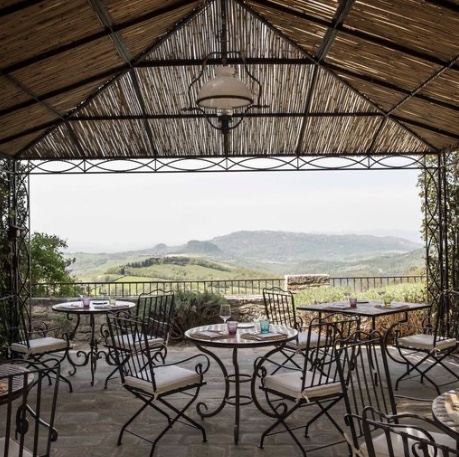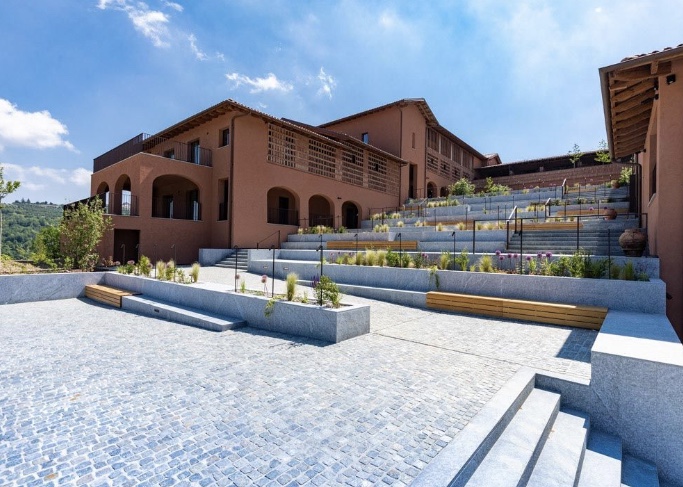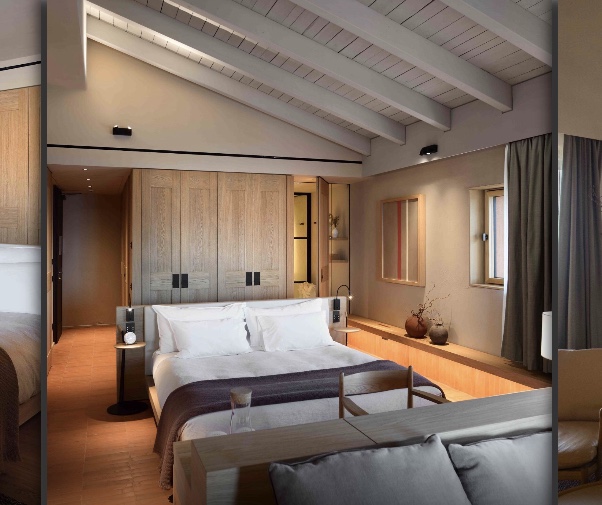By Angela Fairhurst
Beyond Green is a curation of the world’s most sustainable hotels. Founded in April 2021 by Lindsey Ueberroth and Costas Chris, the company’s mission is to set a new standard for global travel and tourism, with sustainability as a top priority. At the heart of Beyond Green are the three key pillars of sustainable tourism best practices, along with a set of more than 50 sustainability indicators aligned with the United Nations Global Sustainable Development Goals (SDGs). The pillars include: environmentally friendly practices, protection of natural and cultural heritage, and social and economic well-being of local people.
Two of Beyond Green’s most impressive locations are located within the beautiful rolling hills of Italy’s most magnificent regions.
BORGO PIGNANO Volterra, Tuscany
Link to Images: https://www.dropbox.com/scl/fo/qj7ir38vs6pfpssublt40/h?dl=0&rlkey=684ytwv7a5v3xsifx0y9oakad

There is beautiful, and then there is stunningly beautiful. Borgo Pignano is just that, remarkable in every way. It’s not just because it’s located in the historic Tuscan countryside – one of the most scenic places in the world – or because its luxury rooms, suites, farmhouses, apartments, and villas have all been restored and decorated with luxury Tuscan style interiors and original 18th century architectural details, or because its food, people, and service are top notch. It’s stunning because 100% of the 750-acre resort is doing everything with a sustainable infrastructure in mind to protect, preserve, and support the environment and the local community. All of these aspects make Borgo Pignano a magical place.
The villa estate of Borgo Pignano was one of the first members of Beyond Green and has earned multiple awards for its commitment to sustainability. Borgo Pignano is situated in the center of Tuscany, between Volterra and San Gimingano, which makes for easy day trips to either of these medieval towns.
The stunning dwellings are made with environmentally friendly products and materials, such as locally sourced stone, reclaimed slate and roof tiles, organic plasters, and eco-paints. Antiques have been gathered from all over the region and are tastefully blended with the finest fabrics and linens to make comfortable and peaceful settings.
The main building is an 18th Century villa with fourteen rooms and suites, some with original frescoes and all with marble and travertine bathrooms. There are other Maisonettes, Villas, and a private house for rent on property. Borgo Pignano is open from March through October.
The center of Borgo Pignano is its organic farm, which provides many of the ingredients used by the kitchen to create an explosion of culinary delight at each meal. The farm raises pigs and chickens; produces olives for cold-pressed olive oil; grows grains, cereals, nuts, and seeds; and
makes organic flours for artisanal pizzas, breads, and pastas. They even create their own jams.
The restaurant, Villa Pignano, has a creative and innovative menu, highlighting many local specialties. Guests can enhance their meals with a rich selection of famous Tuscan organic and biodynamic wines, as well as enjoy the Villa’s own Vermentino white wine and Ciliegiolo and Abrusco Nero di Toscana red wines (all from grapes grown in the property’s vineyards and produced in Pignano’s winery). The native varietals are grown without making use of any chemical products.
Service is discreet yet attentive. Meals can be enjoyed in the dining room or al fresco adjacent to the pool area. The outdoor bar is open daily and features artisanal cocktails.
Sustainability is the backbone for all activities at Borgo Pignano.
The in-house herbalist, Betty, offers lessons in using herbs in the kitchen and cocktail bar for teas, and also for soaps, oils, and lotions. There are cooking classes devoted to the traditional Tuscan ways of making focaccia, breads, pastries, and pizza. Organic and biodynamic wine tastings take place in the historic cellar of Pignano’s 18th-century villa, where experts share their passion for wine accompanied by a selection of cold meats, cheeses, and breads.
With bee colonies around the world diminishing, the importance of attracting healthy bees to Borgo Pignano’s hives is paramount. Growing a wide range of flowers and plants, the Villa’s hives are able to produce Millefiori-flavored honey while at the same time helping to pollinate the expansive selection of vegetables and fruit trees. Guests are invited to acquire knowledge about bee-keeping, the traditional methods of extracting honey and beeswax, and the social structure linking the queen bee, drones, and worker bees.
Bicycles are available for guests to ride on the estate. Well-trained horses reside at a full-size arena on property where instructors provide riding lessons for beginners and excursions for guests to explore the beauty of Tuscany on horseback. There are paths and roads for hikers and runners, a half basketball court, five-a-side football pitch, tennis court, yoga, pilates, and a gym available for guests, while a menu of special spa treatments using natural products made on property from products grown in the garden provide guests with multiple activity options.
With expansive views of the Tuscan countryside, enjoy a dip in the heated infinity pool made with stone carved from a local ancient limestone quarry, which also supplied most of the stone used to build Porta dell’Arco, one of the main gateways of Volterra, as well as Pignano’s own buildings. There is another smaller pool built especially for children under the age of twelve.
Borgo Pignano uses innovative and traditional farming techniques. They actively rotate their fields to improve soil conditions. Pignano’s gardens are maintained by a full time gardening team and nourished with filtered harvested rainwater, while natural and man-made lakes provide irrigation for the farmland.
The resort has eliminated the use of plastic. Organic shampoos, conditioners, soaps, and lotions made from products grown in the property’s garden all come in ceramic containers that are re-filled as needed. The Villa uses filtered water served in glass for both guests and staff.
Gray and waste-water systems allow the re-use of water. Swales, a natural system for retaining rainwater and preventing soil erosion which decreases the need for irrigation, are located throughout the property. Fertilizers are all organic, including horse waste from the property’s animals and alfalfa.
The heating and hot water systems within the Villas are fueled by solar panels and chip-fired boilers that are fed by harvesting wood from thinning out the estate’s forests. With EVs growing in popularity, Borgo Pignano has added two Tesla charging points in the hotel’s parking area. There is very little that Borgo Pignano hasn’t thoughtfully considered.
CASA DI LANGA, Ceretto Langhe
Link to Images: https://www.dropbox.com/scl/fo/tjakwtsracl8clnm9n9s4/h?dl=0&rlkey=7002g9nmnsah1tce497xgzbrp
 Langhe is an historical region of Piedmont, among rolling hills with breathtaking views. The UNESCO-protected area is considered to be one of the best wine-producing regions in Italy. The sustainable Casa di Langa luxury property is located among the Barolo, Barbaresco, and Alta Langa wine-making regions, residing on over 104 acres of natural landscape and forested property, with its own extensive gardens, hazelnut trees, working vineyards, and grounds full of the area’s famous truffles.
Langhe is an historical region of Piedmont, among rolling hills with breathtaking views. The UNESCO-protected area is considered to be one of the best wine-producing regions in Italy. The sustainable Casa di Langa luxury property is located among the Barolo, Barbaresco, and Alta Langa wine-making regions, residing on over 104 acres of natural landscape and forested property, with its own extensive gardens, hazelnut trees, working vineyards, and grounds full of the area’s famous truffles.
Opened in June 2021, the property was collaboratively designed by Milan-based GaS Studio and Parisotto + Formention Architetti. Using local materials and soft neutral colors and earth tones to reflect the area’s surroundings, the oak, terracotta, stone, and light wood bring an aura of comfort and relaxation to the place. Local Pietra di Luserna stone was sourced from Piedmont together with 100% recyclable terra cotta and raw, earth-based plasters from Lombardy-based Matteo Brioni. All wooden elements – such as flooring and millwork – are certified formaldehyde-free. The result is 39 ample-sized guestrooms and suites equipped with refined Italian furnishings and featuring such brands as B&B Italia, Cassina, DePadova, and Meridiani. The comfortable beds feature deluxe mattresses by Midsummer Milano, and the linens and accessories are handmade in Italy using natural and sustainable materials such as cotton, silk, and wool. Equipped with rain showers and LeLabo toiletries in refillable containers, the rooms also have private terraces with views of the green valleys, distant snow-capped Dolomites, and the medieval tower of the Serralunga d’Alba Castle.
Luxury through sustainability is a key focus at the resort. Casa di Langa is committed to the use of 100% recycled water, as well as to collecting and storing 100% rainwater for irrigation. The hotel is plastic-free, instead using glass or aluminum that are always returned and recycled. Helping to reduce the hotel’s carbon footprint, solar panels and geothermal pipes heat and cool guestrooms, and a pellet boiler provides heated sanitary hot water. All purchased energy comes from green energy production. All company vehicles are fully electric, and the property provides complimentary charging stations for guests.
The resort’s farm-to-table restaurant and bar, Fàula, serves up classic local dishes and utilizes foods grown in the estate gardens or locally sourced ingredients from small organic growers. Sori cocktail bar is open daily from 11am – midnight for wine, cocktails, or a quiet snack by the water-vapor fireplace. The full-time gardening team employs sustainable agriculture and conservation practices, such as reforesting the land, planting native trees, and covering plants in wood chips to reduce watering from twice a week to twice a month. They grow all sorts of herbs and aromatics, as well as fruit trees and seasonal vegetables. Any kitchen waste is composted and used in the organic garden. There are 40 beehives on the property, enhancing the biodiversity of the region as well as supplying honey for the hotel. Cooking classes, a wine academy, Vespa and bike tours, and an immersive, on-property truffle hunt with Lagotto dogs are among the authentic experiences available to guests.

For wellness and rejuvenation, the hotel’s Lelose Spa & Wellness features ecologically-minded treatments, techniques, and ingredients. The spa comes complete with a Jacuzzi, Finnish sauna, bucket shower, and relaxation area with tea and dried fruits. Yoga and pilates sessions are available. The heated infinity pool sits centerstage on-property with a spectacular view, and a fitness center open from 5am-12am daily features Technogym equipment, a stationary bike, treadmill, workout bench, and free weights.





